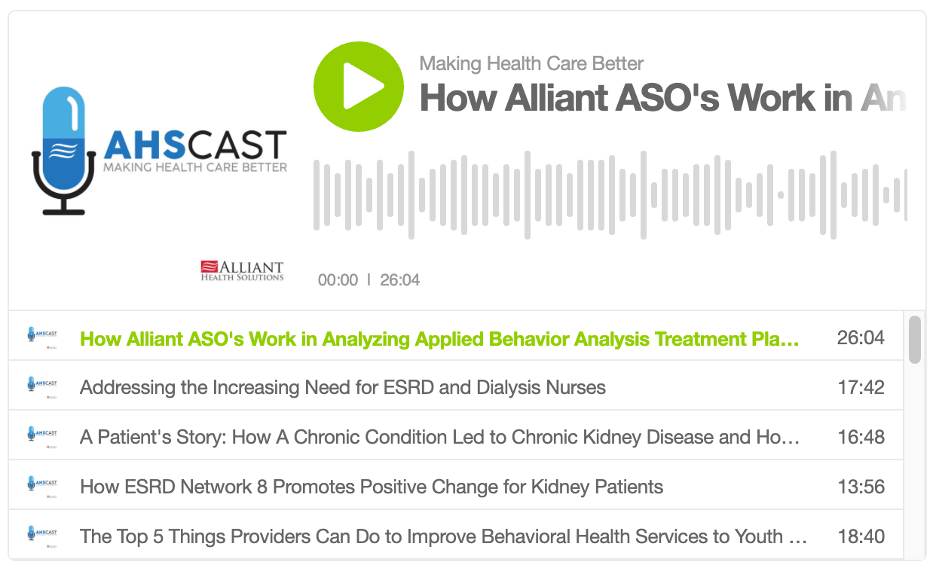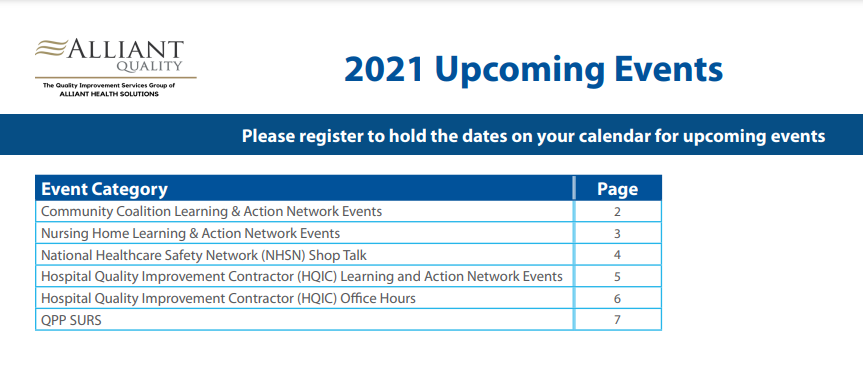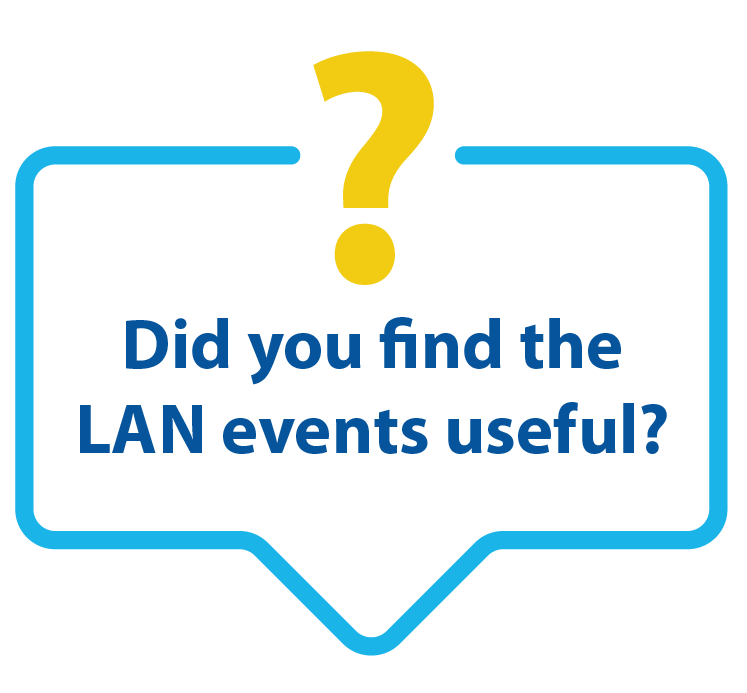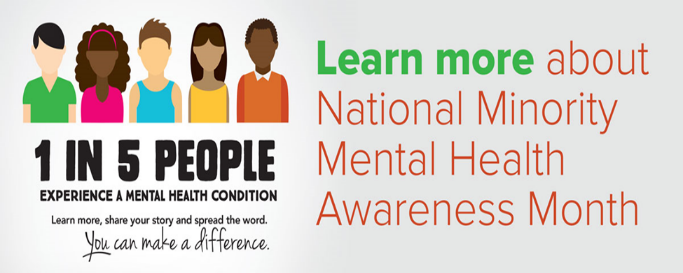|
|
|
|
Please share this email with friends or colleagues using these links:           
(Please do not forward the email as it may impact your subscription settings)
|
|
A monthly newsletter highlighting events and resources for Nursing Homes & Community Coalitions
In This Issue:
|

CMS Releases New Resources To Support COVID-19 Vaccinations
The Centers for Medicare & Medicaid Services (CMS) released two new resources for long-term care facility (LTCF) care teams and other health care providers to support COVID-19 vaccinations:
- Optimizing Vaccine Recipient Education: Aids health care providers in building patient confidence in COVID-19 vaccines. The impactful strategies shared in this tool will help reinforce the provider’s role as a trusted source for vaccine information. Download Tool
- Considerations for Long-Term Care Facilities on Acquiring COVID-19 Vaccination Resources: This document provides LTCFs with information about acquiring COVID-19 vaccination resources for staff and residents. Download Resource
|
|
|
|
Our team is collecting and curating the essential trainings, events, resources, and vaccine updates about COVID-19 on our website so you can visit one page to find the information you need. We've also outlined the essentials below.
View All COVID-19 News & Resources
Training & Resources
CDC's New Webpage Reviews Info and Training on How to Enroll as a COVID-19 Vaccinator
CDC posted a new web page, How to Enroll as a Healthcare Provider, for providers seeking to become COVID-19 vaccinators. The web page contains information on how to become a COVID-19 vaccinator and the training and resources available to prepare for that role. Only healthcare professionals enrolled directly through a health practice or organization as a vaccination provider can legally store, handle, and administer COVID-19 vaccines in the United States Healthcare personnel can play a critical role in helping to end the pandemic. Learn how you can be a part of COVID-19 vaccination efforts even without being enrolled as a COVID-19 vaccination provider. How to Enroll
|
|
|
Leadership Lessons
Words of advice from leaders on the front lines.
This month’s leadership lesson is from Libby Massiah, Chronic Conditions Aim Lead at Alliant Quality.
Using Communication (and Laughter) as a Morale Booster
Communication has become a necessary leadership tool in the past year. We heard many great leaders discuss the various communication activities they used to enhance organization function and morale. Even though we encountered challenges we never imagined, great ideas, science breakthroughs and unlikely partnerships blossomed among all the loss, pain and isolation we experienced.
Learning that the world was shutting down was terrifying for some of us. We worried about shopping and day-to-day routines and felt a sense of loss and freedoms being restricted. Some were concerned about not making the social connections that were part of their coping methods. Many weren't able to attend family events, worship services or therapy.
Leaders from families, businesses and communities stepped forward to teach others how to connect through technology. Dr. William Ferro, owner of Betr Health, a lifestyle change company, said that established online meeting and telehealth platforms were "a solution waiting for a problem."
Family leaders coordinated game nights using online apps and live videos. Healthcare providers pivoted to using platforms already available to patients, and medical payers quickly adjusted policy to allow payment for those services. Narcotics Anonymous, Alcoholics Anonymous and similar support organizations figured out how to host online meetings. Churches embraced Facebook Live to message and communicate with their congregations in a way that televised services never could.
Alliant Health Solutions leadership increased communications through town hall meetings and frequent CEO updates. Then Alliant went a step further to boost morale through trivia nights and other fun social events. Supervisors check-in with staff routinely.
Read on our Website
Best Practice Corner
Each month Alliant Quality collects exemplar practices from organizations across the seven-state region. Thank you for your leadership, creativity, and perseverance.
Tennessee Department of Health Addresses Vaccine Hesitancy with New Campaign The Tennessee Department of Health released its new COVID-19 “Give It A Shot” campaign addressing vaccination hesitancy. The department’s public service announcements (PSAs) will run statewide on television and radio from May through November. View the PSA toolkit here.
FMDA Launches New Vaccine Confidence Initiative for Skilled Nursing Home Staff
The Florida Society for Post-Acute and Long-Term Care (PALTC) Medicine launched its vaccination confidence initiative focused on Florida skilled nursing facilities with the lowest staff vaccination rates. Staff will be engaged in person and virtually to increase their knowledge and have open discussions with experts in post-acute and long-term care. For more information, visit www.fmda.org.
Louisiana Department of Health Is Now Posting COVID-19 Vaccination Rates for Nursing Facility Residents and Staff on COVID-19 Dashboard
On June 2, the Louisiana Department of Health began posting the vaccination rates for nursing facility residents and staff members on their COVID-19 Dashboard. The data is collected from nursing home facilities that report their vaccination rates to the Office of Public Health (OPH). This data is updated weekly.
Do you have a promising practice to share? Please reply to this email and we will feature you in an upcoming issue.
|
AHSCAST - Making Health Care Better
 |
Everyone deserves quality health care.
Tune into the Alliant Health Solutions Making Health Care Better podcast every other Thursday as they interview guests committed to making health care better. If you are a health care consumer, provider, insurer, system, or consultant, this is the podcast for you. View All Podcast Episodes |
|
Events
|
Upcoming Learning & Action Network (LAN) Events
 Important Update: There have been some changes to the LAN registration links. If you downloaded Alliant’s 2021 Upcoming Events PDF, please disregard it. A new PDF with the updated registration links has been added to our Virtual Education Events webpage. Important Update: There have been some changes to the LAN registration links. If you downloaded Alliant’s 2021 Upcoming Events PDF, please disregard it. A new PDF with the updated registration links has been added to our Virtual Education Events webpage.-
Special Event (Florida Residents ONLY): Florida Naloxone and Overdose Prevention
Wednesday, July 14 at 2:30 p.m. ET / 1:30 p.m. CT (45 min.)
Opioid overdose is the leading cause of accidental death in the United States. Naloxone has been proven to reverse the effects of opioid overdose. Teaching people to administer naloxone effectively prevents deaths among those who may overdose or misuse opioids. This free event is for anyone in Florida with an interest in learning more about administering naloxone.
Register Now | View Agenda
- Nursing Homes: Understanding F-758: A Practical Approach to Gradual Dose Reductions (GDRs) With a Definite Purpose
Tuesday, July 20 at 2:00 p.m. ET / 1 p.m. CT (30 min.)
This Learning and Action Network event will provide a true clinical understanding of how to perform effective GDRs and the tools needed to enhance the quality of care, quality of life and positive outcomes for residents.
Register Now | View Agenda
-
Community Coalitions: Optimizing Care Transitions of Older Adults with Diabetes
Thursday, July 22 at 12:30 p.m. ET / 11:30 a.m. CT (30 min.)
Over 25% of adults over the age of 65 have diabetes. Multi-morbidity, geriatric syndromes and psychosocial factors make older adults with diabetes particularly vulnerable to poor outcomes during care transitions. This webinar focuses on the factors contributing to the complexity of care transitions for older adults with diabetes and interventions to support effective care transitions.
Register Now | View Agenda
Register for Upcoming LAN Events
Last Month's Learning & Action Network (LAN) Events
- Nursing Homes: Developing a Sustainable Water Management Plan in Nursing Homes
Recorded on June 15, 2021
View Recording | View Slides
- Community Coalitions: Go to the Hospital or Stay Here: The Use of Evidence-Based Decision Guides To Reduce Readmissions
Recorded on June 24, 2021
View Recording | View Slides

Were You Able to "Use Tomorrow" What You Heard During the LAN Events?
If Yes, Click Below.
Nursing Homes LAN Attendees: Click here
Community Coalition LAN Attendees: Click here
Last Month's COVID-19 Events
Upcoming Infection Prevention Shop Talks
- July 2021 Shop Talk Call
Thursday, July 15 at 2 p.m. ET / 1 p.m. CT (60 min.)
Find out about updates and support for surveillance, tracking and infection prevention in nursing homes using the National Healthcare Safety Network (NHSN). This webinar is focused on submitting COVID-19 data, but may include other components such as C.diff, UTIs, and hand hygiene.
Register Now
|
Resources
|
|
Save a Life: Prescribe Naloxone With Every Opioid
On average, more than 90 Americans die from an opioid overdose every day. Make prescribing naloxone a universal practice with every opioid prescription. It’s a safe, quick-acting medication that restores breathing. In addition, beneficiaries, medical staff, families and care partners can be easily trained to administer naloxone to save a life.
July Is National Minority Mental Health Awareness Month
 Formally recognized in June 2008, Bebe Moore Campbell National Minority Mental Health Awareness Month was created to bring awareness to the unique struggles that underrepresented groups face with regard to mental illness in the United States. Bebe Moore Campbell was an American author, journalist, teacher and mental health advocate who worked tirelessly to shed light on the mental health needs of the Black community and other underrepresented communities. To continue the visionary work of Bebe Moore Campbell, the nonprofit Mental Health America develops a public education campaign each year dedicated to addressing the mental health needs of Black, Indigenous, and People of Color. The 2021 toolkit examines community-developed systems of support created to fill gaps within mainstream healthcare systems. Download the Toolkit Formally recognized in June 2008, Bebe Moore Campbell National Minority Mental Health Awareness Month was created to bring awareness to the unique struggles that underrepresented groups face with regard to mental illness in the United States. Bebe Moore Campbell was an American author, journalist, teacher and mental health advocate who worked tirelessly to shed light on the mental health needs of the Black community and other underrepresented communities. To continue the visionary work of Bebe Moore Campbell, the nonprofit Mental Health America develops a public education campaign each year dedicated to addressing the mental health needs of Black, Indigenous, and People of Color. The 2021 toolkit examines community-developed systems of support created to fill gaps within mainstream healthcare systems. Download the Toolkit
Strategies to Prevent Opioid Misuse in Hospitals
Opioids provide effective dose-dependent pain relief with minimal toxic effects and can be administered via various delivery systems. However, there is increasing recognition that errors in prescribing, administering and monitoring patients on opioid therapy can lead to serious side effects and adverse events. The widespread use of opioids in hospitals and discharging patients on opioids can lead to long-term use, misuse, and potential dependence and addiction. Read More
|
|
CDC COVID-19 Vaccine Webinar Series
The Centers for Disease Control and Prevention (CDC) offers a series of 15- to 20-minute interactive, web-based trainings to address issues related to COVID-19 vaccination. These trainings are intended for immunization providers, such as physicians, nurses, nurse practitioners, pharmacists, physician assistants, medical students, state and local immunization programs and others authorized to administer vaccines. Topics range from routine clinical and vaccine safety information to guidance for on-site clinic vaccination activities and patient education. Continuing education credits are available. Read More
Invest in Trust: A Resource for Building COVID-19 Vaccine Trust Among CNAs
Despite their role in caring for people in settings that have seen high rates of COVID-19 and their front-of-the-line access to COVID-19 vaccines, some of the essential people in nursing homes—certified nursing assistants (CNAs)—have expressed concerns about getting vaccinated. There is no single solution to this challenge because the reasons are varied, complex and not specific to any one demographic. The Agency for Healthcare Research and Quality created a guide to help nursing home administrators build trust in the COVID-19 vaccines among CNAs and overcome barriers that may make getting the vaccines especially challenging. Download the Guide
We Can Do This: HHS Campaign To Increase COVID-19 Vaccine Confidence
The U.S. Department of Health and Human Services created a nationwide COVID-19 public education campaign to increase public confidence and uptake in COVID-19 vaccines while reinforcing basic prevention measures such as wearing masks and social distancing.
Through consistent, fact-based public health messaging, the campaign helps the public make informed decisions about their health and COVID-19, including steps to protect themselves and their communities. The public education activities are organized around three themes:
- Slow the Spread: Basic prevention measures that should be taken while waiting for the vaccine
- Building Vaccine Confidence: Information and resources to build vaccine confidence, timed to support action when vaccines are available
- Preparing the Nation: Fact-based, scientific information about vaccine development, safety, and effectiveness
Download Campaign Resources and Toolkits

|
Essential Resources to Help You Navigate NHSN
Below is a quick summary of the benefits and some resources related to COVID-19 reporting in NHSN.
Benefits to reporting COVID-19 Vaccine data in NHSN:
- NHSN module for weekly vaccine tracking of both resident and staff
- Consistent reporting over time within single facility
- Comparable across facilities
- Allows for targeted improvement efforts
- Easily generate reports to inform visitation plans and to understand motives for declination/contraindication for vaccines
Resources:
Watch Our NHSN Shop Talk Shorts Series!
We know you're busy. Our new video series answers the most common questions we receive regarding navigating NHSN in a brief way. Available videos cover the following topics:
View NHSN Shop Talk Video Series
|
 |
Access FREE expert guidance on this topic: Contact Melody Brown |
|
|
New CDC Maps Identify Where Chronic Conditions Resources Are, Areas in Need of Resources and Areas With High Chronic Condition Rates
The CDC updated and improved the chronic conditions maps and website to include county-level data to investigate social determinants of health, population makeup, disease density, and more. When looking at readmissions or gaps in care, these maps can help pinpoint those areas using data. View the Map
Using Technology to Improve Patient Engagement
Take a look at the Hi Bridge Solutions archived webinar on utilizing electronic health records (EHRs) to identify patients with hypertension that may not be addressed. Proactive interventions can impact your quality and cost measures if you participate in CMS incentive programs. More importantly, they can help patients maintain their quality of life. Join the discussion on maximizing the data available from EHRs to advance proactive patient engagement. Watch the Webinar
New Chronic Kidney Disease (CKD) Prevention and Awareness Resources
Help spread awareness to encourage improved screening of high-risk patients for chronic kidney disease (CKD). We have customized primary care/provider awareness flyers for each state with data on screening beneficiaries with diabetes and hypertension in each state and resources to identify, test and stage for CKD. View CKD Webpage | Download New CKD Screening Awareness Flyers
Meet the Asian Health Coalition
Health equity is an issue that has recently demanded a lot of attention. But some organizations have been working to provide research, outreach, care and resources for years. Over the past 22 years, the Asian Health Coalition has developed many health programs and made considerable inroads to reach and educate immigrant and refugee populations. They have outreached and provided screen and assistance to over 20,000 people, including those with chronic conditions. They have partnered with community-based health and government organizations to create and establish resources for people to learn about health issues facing their populations, health insurance enrollment, screening opportunities and access to life-saving care. Learn More
|
|
Two-Part Podcast Series Discusses the Questions To Consider When Returning to Hybrid or In-Person Meetings
“How We Return and Why It Matters” is a podcast in which Brene Brown interviews Priya Parker, author of The Art of Gathering. Tune in to learn how to be intentional about asking ourselves and our teams what we have learned during this time about our work, about the core of what we do as a team and how we might consider restructuring meetings to allow for true hybrid participation. How do we manage the inclusion of those participating remotely in an equitable way? How do we physically share space knowing everyone is coming out of their protective zones at different paces? How do we anticipate and manage those moments of perceived rejection if we reach out to shake someone’s hand and they instinctively lean back? Taking the time as a team to talk about what we should bring back, what we should not bring back and what we want to re-invent as we return to in-person or hybrid meetings can strengthen our community coalitions. Listen Here
Best Practices for Implementing the Hospital Decision Guide
Our June LAN event, Go to the Hospital or Stay Here: The Use of Evidence-Based Decision Guides To Reduce Readmissions, featured the Hospital Decision Guide, which can help reduce readmissions and improve patient and family satisfaction. The Best Practices for Implementing the Guide and Trifold document can facilitate introducing the Hospital Decision Guide to providers in your coalition. It also covers how to discuss preadmission and admission during family meetings, care conferences and when the patient’s condition changes. If you missed the LAN event, you can view the LAN materials or listen to the recording here.
National COVID-19 Resiliency Network (NCRN)
Alliant Health Solutions is partnering with Morehouse School of Medicine (MSM) on a national initiative to mitigate the impact of COVID-19 on vulnerable populations. As an NCRN community partner, we invite everyone to join, engage, and subscribe to the newsletter to receive updates and information. It will take a collaborative effort to combat the negative impact of this pandemic. Subscribe Now
 |
Access FREE expert guidance on this topic: Contact Carolyn Kazdan |
|
Surviving Post-COVID: Reducing Avoidable Emergency Department Visits and Hospital Admissions
Avoidable emergency department (ED) utilization by nursing home (NH) residents is a concern among NH providers and an opportunity for greater clinical efficiency, enhanced systems and processes of care. Strategies to reduce avoidable ED use among residents begins at the time of admission and necessitates a consistent team effort. Read this article for information NHs can use to begin the improvement process.
Below are the 13 topics that NH teams must know to manage the COVID-19 pandemic. They are self-paced training resources.
|
Members of the Beneficiary & Family Advisory Council are our partners in making healthcare better. To join us in this important work, contact Mel Brown or submit this referral form.
Browse resources our council has worked on below:
Fully Vaccinated Against COVID-19? What You Need to Know
According to the CDC, fully vaccinated people can resume daily activities without wearing a mask or physically distancing, except where required by federal, state, local, tribal or territorial laws, rules, and regulations, including local business and workplace guidance. If you haven’t been vaccinated yet, find a vaccination site. Read More
Tips for the Best Types of Masks and How to Wear Them
There are many types of masks you can use to protect yourself and others from getting and spreading COVID-19. When choosing a mask, choose one that fits snugly. Learn More About How To Choose a Mask That Fits Well and Offers the Best Protection.
|
 |
For more information about Alliant Quality:
www.alliantquality.org
Share this email with a friend or colleague:  
|
Connect with us!
    Click here if you'd like to share your corporate profiles with us and we'll connect with you!
Click here if you'd like to share your corporate profiles with us and we'll connect with you!
|
 |
|
|
|
|